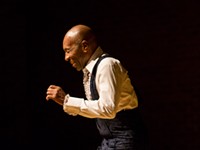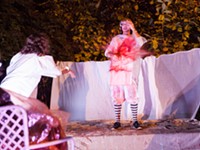My Saturday night at the Rochester Fringe Festival was full of death, running the gamut of age. I was moved and impressed by "Percentage," presented by RAPA at the School of the Arts' Black Box Theatre. A production penned and performed by SOTA students, the play presents a series of vignettes that explore the various tragedies caused by bullying.
What was once dismissed as the normal crucible of adolescence has reached a place that can no longer be ignored. Most -- but not all -- kids had a sanctuary from stress and drama while at home, but that's gone by the wayside in the age of the Internet. At some point, "You can't sit with us" became "You should just kill yourself."
Relentless cyberbullying -- which, like road rage, sees a certain increase in viciousness because the conflict has a buffer from face-to-face interaction -- is one of the problems "Percentage" addresses. The play also tackles male-on-male aggression; the social underdog-turning-violent; unhelpful teachers; and beta clique members grasping at the ethics of going with or defying the alphas, at the risk of facing alienation themselves.
Those poised SOTA students offered a really nuanced look into these situations. They should; they're living it. They deftly depict adolescence as a time when kids shift from relative innocence to navigating a fundamental lack of control, in which kids seek to assuage that problem by unproductive means. And they also smartly switched the audience's perspective with each scene, orienting the classrooms and other sets differently to best showcase the particular drama.
Angst-filled youth are a powerful force, but they don't always know how to channel that power. These young artists do. Hold onto your hearts, kiddos.
Unfortunately, this was the only performance of "Percentage" during the Fringe.
Next up was "Krapp's Last Tape," a one-man play by Samuel Beckett. I was unfamiliar with this play, but knowing that Beckett's work can be dark, I girded myself for a show about an old man -- portrayed by local actor David Byrne -- reliving his past through his reel-to-reel recordings.
Byrne does wistful well. Krapp is a lonely fellow, self-isolated through decades of over-analyzing his lived experience and never letting himself settle comfortably into a peacefully content, if imperfect, situation.
Through the intimate medium of the voice and a little stage acting, we gain a glimpse into Krapp's late-night puttering as he spools and un-spools yarns from his life, reflecting and retreating further into regret. "Did I ever sing? No," he ruminates.
Throughout the show, Krapp works his way through old recordings, nodding thoughtfully at what former opinions still ring true, grimacing with disgust at what no longer resonates, and becoming progressively fixated on his loss of a significant relationship. Drinking and "drowned in dreams and burning to be gone," Byrne brings the evidence that Krapp now sees the fool he's been. "All that old misery, once wasn't enough for you," he sadly tells himself.
But it's too late; the energy to change slipped away when he wasn't paying attention. For his final recording, the man who was once so pretentiously verbose and deemed the world he judged worthy of rejection, is at a loss for words.
This was the only performance of "Krapp's Last Tape" during the Fringe.
Though it provided plenty of sobering considerations, at least "Bridge Club of Death," a poignant play by Mark Jabaut performed at Writers & Books, also supplied constant crackups. Fearing they will become the walking dead, four elders spend their final years at a nursing home, playing cards while they conspire to assist the suicides of those slipping away around them. The plot thickens when the condescending caretaker, Mr. Cornhall (Ian E. W. Von Fange), sniffs the scheme.
"I heard he was abandoned as a child and raised by a whole pack of attorneys," one of the justifiably crotchety characters quips about the cold-hearted Cornhall. The feeble but periodically sharp Lou (T. Bohrer) almost constantly had the audience in stitches. And a sweet subplot forms when sass-master Alice (played by Denise Bartalo), with her nonchalant darkness, is courted by the aptly-named Frank (Roger Gans).
But the flow of geriatric wooing, not to mention the death-with-dignity conspiracy, is dammed when one of their own fades further and is relegated to languish in the "memory care" ward. Factions form, and the ever pragmatic Betty (Marcy Gamzon) is forced to make a tough call, and is offered an uneasy alliance with Cornhall.
The wonderful play offers no obvious resolution, and rightfully so. But I found the covenant offered by Cornhall to have a hollow ring to it. Big Pharma has a stake in keeping elders alive as cash cows, and Cornhall doesn't care about them. So what's his angle?
"Bridge Club of Death" will be performed again on Saturday, September 26, at Writers & Books. 2 p.m. $10. Appropriate for ages 13 and older.









